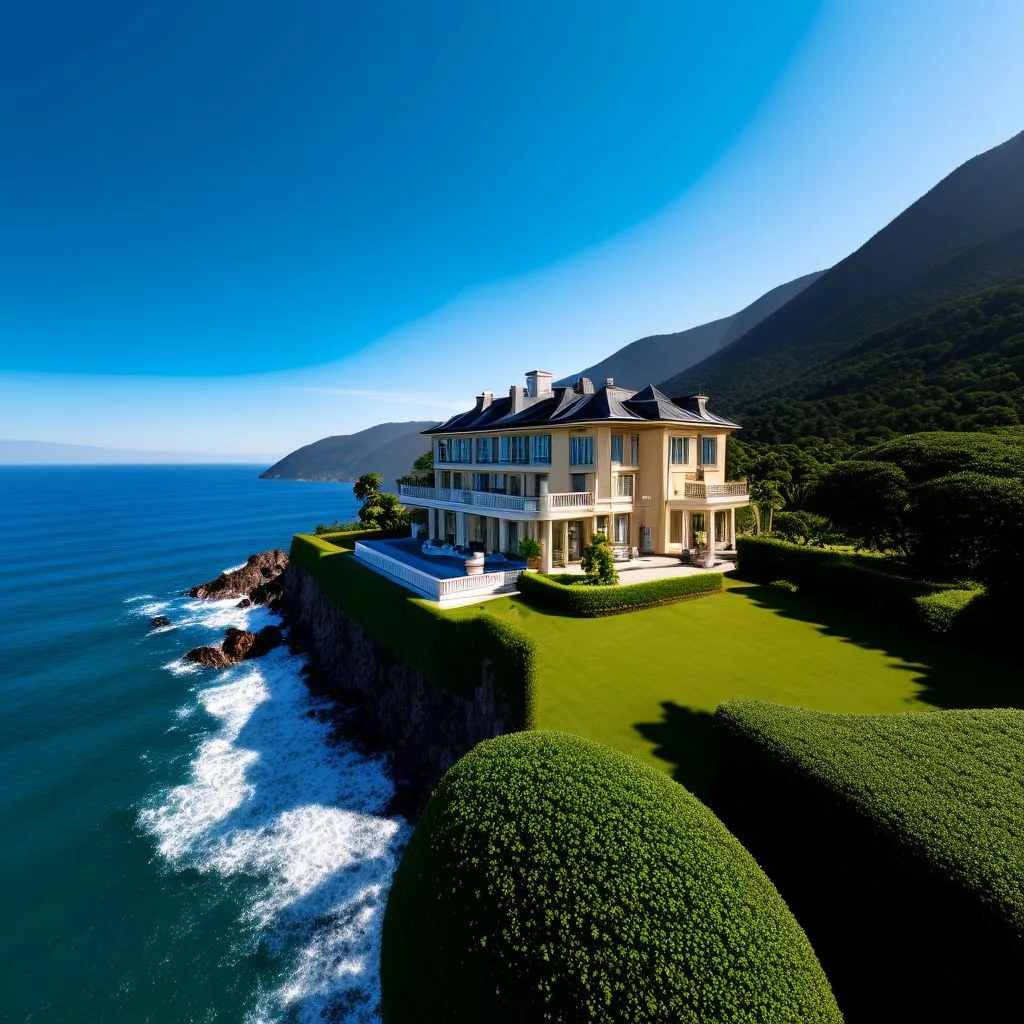Cape Town is shining bright in the luxury real estate world, attracting wealthy buyers with its stunning views and lively lifestyle. Areas like the Atlantic Seaboard and Southern Suburbs are hot spots, seeing record sales and soaring property values. In just the first few months of this year, high-end homes sold for over R20 million, reflecting a strong economy and high demand. The city’s mix of natural beauty and chic urban living makes it a dream destination for affluent individuals from around the globe. With limited properties available, Cape Town’s luxury market continues to thrive, promising a lifestyle of prestige and aspiration.
What drives the luxury real estate boom in Cape Town?
Cape Town’s luxury real estate boom is driven by factors such as breathtaking natural beauty, a cosmopolitan lifestyle, and limited inventory. Key areas like the Atlantic Seaboard and Southern Suburbs are seeing record sales, attracting affluent buyers from around the world, and reflecting high economic confidence.
Unprecedented Surge in High-End Property Sales
In the world of luxury real estate, Cape Town stands out as a glittering gem, attracting the affluent from both near and far. The first quarter of this year has set a new benchmark, with sales of high-end homes exceeding R20 million reaching unprecedented levels. The Seeff Property Group, a dominant force in this market, sheds light on the factors propelling this surge, particularly in the coveted Atlantic Seaboard and Southern Suburbs.
The Atlantic Seaboard, celebrated for its stunning ocean views and mountainous backdrop, has become synonymous with opulence. Data from Propstats highlights this trend, showing an impressive 53 high-value sales totaling over R1.6 billion in just the first three months of the year. Notably, half of this figure stems from a mere 25 transactions within these elite neighborhoods. The pinnacle of this trend is reflected in the sale of a 383m² apartment in The Aurum, Bantry Bay, which commanded a striking R65 million. Ross Levin, the licensee for Seeff Atlantic Seaboard, attributes this boom to local buyers who regard Cape Town’s property market as a reliable investment.
This surge in Cape Town’s luxury property market extends beyond mere numbers, signaling broader economic confidence and lifestyle aspirations. Properties, especially those under exclusive mandates, are selling at an accelerated pace, often within just five weeks. Levin observes that even older properties, previously languishing on the market, are now swiftly finding new owners, underscoring the high demand and limited supply.
A Narrative of Aspiration and Prestige
The story of Cape Town’s real estate is one of aspiration and prestige, with each sale adding to the city’s illustrious tapestry. For example, recent sales in Camps Bay include homes sold for R45 million, R21 million, and R33.75 million, reflecting the international allure of these properties. The buyer demographic extends beyond locals, with individuals coming from Germany, the UK, and other parts of South Africa, highlighting a significant trend of semigration. Seeff agents Adrian Mauerberger and Bryan Ginsberg emphasize that the market’s vibrancy is driven by a shortage of inventory across all price ranges, presenting a prime opportunity for sellers.
But what makes Cape Town so irresistible to high-net-worth individuals? The city offers a unique blend of natural splendor, a cosmopolitan lifestyle, and world-class amenities. The Atlantic Seaboard, often likened to the French Riviera or Monaco, provides a picturesque setting where mountains meet the sea. This idyllic environment, combined with a sophisticated urban lifestyle, solidifies its status as South Africa’s most sought-after real estate market.
Complementing this narrative, the Southern Suburbs, particularly Bishopscourt and [Constantia](https://capetown.today/old-town-italy-a-true-taste-of-italian-cuisine-and-culture-in-constantia/) Upper, have also witnessed a rise in high-value transactions. Francois Venter, a leading agent for Seeff in the area, reports six recent high-value sales, including a vacant plot in Bishopscourt sold for R20.25 million and homes in Constantia fetching up to R42 million. These suburbs offer a tranquil escape from the urban hustle, featuring expansive gardens, luxurious amenities, and proximity to top schools and historic wine estates.
Rising Property Values and Historical Trends
Understanding the recent surge in Cape Town’s luxury property market also requires a look at historical data. Comparing the first quarter of 2025 to 2020 reveals a significant appreciation in property values. For instance, Clifton’s average selling price increased from R37 million to R42 million, Bishopscourt from R15.84 million to R24.65 million, and Camps Bay from R13.18 million to R24.14 million. This upward trend reflects not only market dynamics but also the intrinsic value these locations offer.
Clifton, with its pristine beaches and exclusive residences, remains the epitome of luxury living. The rise in its average selling price to R42 million underscores its status as a premier destination for the affluent. Similarly, Bishopscourt and Constantia Upper, with their lush landscapes and proximity to historic wine estates, offer a blend of country charm and urban sophistication. The allure of these suburbs lies in their natural beauty as well as the privacy and amenities they offer, from tennis courts to swimming pools.
The Waterfront, another prime area, saw its average selling price soar from R11.2 million to R21.61 million. This locale, featuring a vibrant mix of retail, dining, and residential spaces, offers a lifestyle that is both cosmopolitan and relaxing. The Waterfront’s charm lies in its unique setting, where luxury yachts dock and world-class events unfold, creating a dynamic and affluent community.
Diverse and Prestigious Neighborhoods
Bantry Bay and Fresnaye, known for their spectacular views and proximity to the city center, have also experienced rising property values. Bantry Bay’s average selling price climbed to R21.58 million, while Fresnaye’s increased to R17.4 million. These neighborhoods offer a fusion of modern living and natural beauty, attracting both local and international buyers.
Higgovale, another distinguished area in Cape Town’s real estate market, witnessed a massive R85 million sale, although its average selling price slightly dipped to R21.51 million. This suburb, with its leafy streets and panoramic views, offers a serene yet upscale living environment. Constantia, rich in history and home to vast estates, saw its average selling price rise from R12.565 million to R21.07 million, reflecting the sustained demand for properties in this picturesque suburb.
Oranjezicht, celebrated for its charming Victorian homes and close-knit community, saw its average selling price increase to R16.56 million. Nestled at the base of Table Mountain, this suburb offers a unique blend of historic charm and modern conveniences, making it a highly desirable location for discerning buyers.
In conclusion, Cape Town’s luxury property market is about more than just the properties themselves; it’s about the lifestyle and status they confer. The city’s unique combination of natural beauty, cosmopolitan living, and world-class amenities makes it a magnet for high-net-worth individuals. Whether it’s the Atlantic Seaboard, Southern Suburbs, or other prime locations, each area offers its distinct allure. As the market continues to evolve, Cape Town remains a beacon of luxury and prestige, drawing buyers from around the globe to its shores.
FAQ – Cape Town’s Luxury Real Estate Market
What areas in Cape Town are considered the hot spots for luxury real estate?
Cape Town’s luxury real estate market is primarily concentrated in the Atlantic Seaboard and Southern Suburbs. These areas have become synonymous with opulence, offering stunning ocean views, lush landscapes, and a cosmopolitan lifestyle that attracts affluent buyers from around the world.
What factors are driving the luxury real estate boom in Cape Town?
The luxury real estate boom in Cape Town is driven by a combination of breathtaking natural beauty, a vibrant urban lifestyle, and limited inventory in key areas. Economic confidence and high demand from both local and international buyers further contribute to the surge in property sales.
What are the recent trends in high-end property sales?
In the first quarter of this year, high-end homes in Cape Town have sold for over R20 million, with record sales hitting R1.6 billion across 53 high-value transactions. Properties are selling rapidly, often within five weeks, indicating strong demand and limited supply in the market.
How have property values changed historically in Cape Town’s luxury market?
Comparing recent data shows significant appreciation in property values. For example, the average selling price in Clifton increased from R37 million to R42 million, while Bishopscourt saw its average rise from R15.84 million to R24.65 million. This trend reflects the intrinsic value and desirability of these locations.
Who are the typical buyers in Cape Town’s luxury real estate market?
The buyer demographic in Cape Town’s luxury market includes both local and international affluent individuals, with noteworthy interest from buyers in Germany, the UK, and other parts of South Africa. This trend also highlights a phenomenon known as semigration, where individuals from other regions are relocating to Cape Town for its appealing lifestyle.
What amenities and features make Cape Town’s luxury properties appealing?
Cape Town’s luxury properties offer a unique blend of natural beauty and world-class amenities. Features such as stunning ocean views, expansive gardens, proximity to top schools and historic wine estates, and luxurious amenities like tennis courts and swimming pools contribute to the city’s appeal. The overall lifestyle, combining urban sophistication with a tranquil environment, makes it a sought-after destination for high-net-worth individuals.











